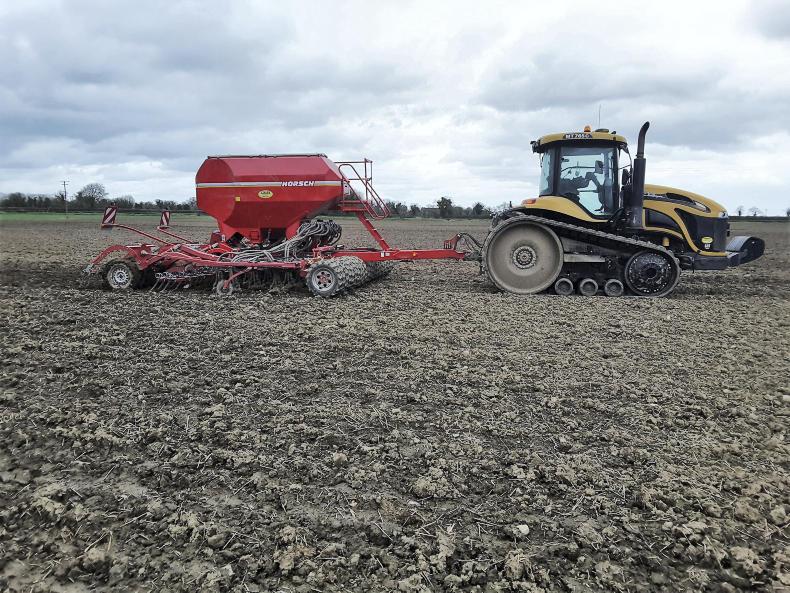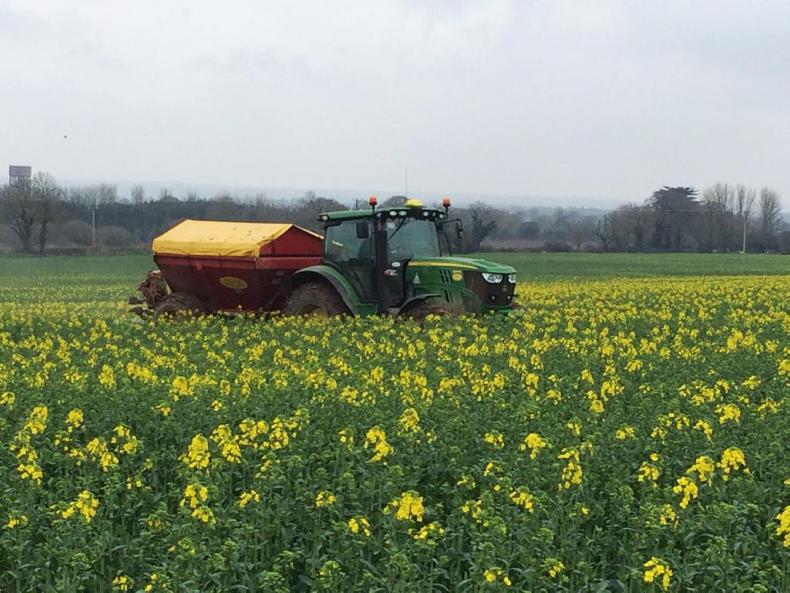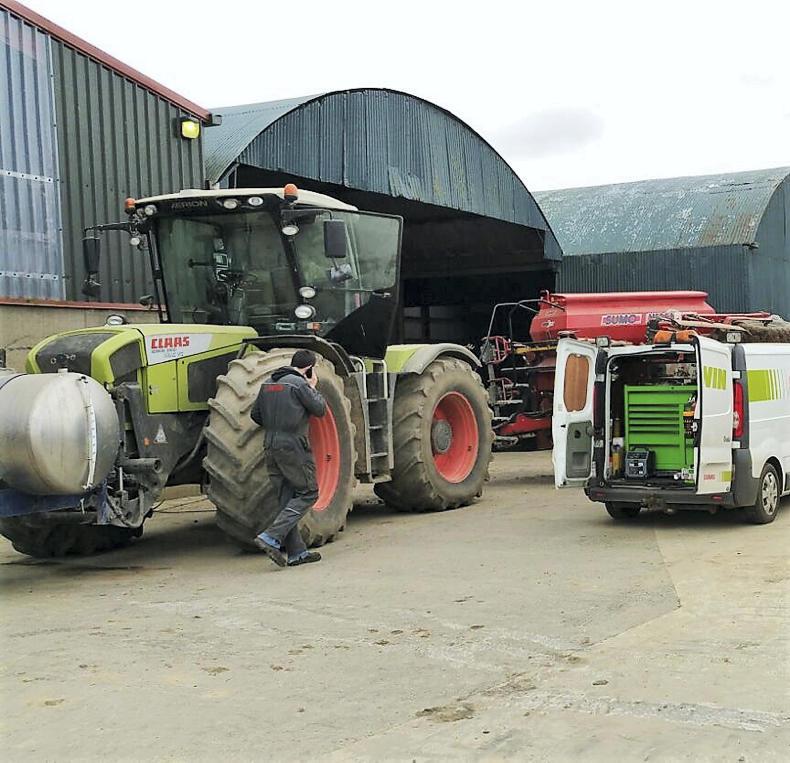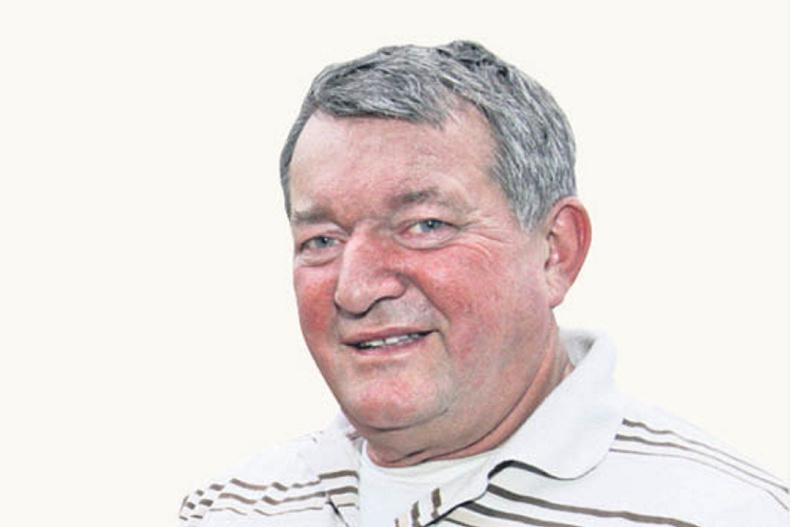This week we revisit our growers in counties Meath, Cork and Derry. Weather continues to dominate the headlines as little progress in spring planting has been made over the last four weeks. However, spring is tantalisingly close and our growers are ready to jump once the weather settles.

Clonee, Co Meath
Waterlogged fields caused by the prolonged wet weather are just beginning to soak as Martin begins to make progress with spring planting. Ground conditions have generally been OK for spreading and spraying but have been too sticky for min-till cultivations or sowing until recently.
Progress with spring planting
Martin normally has a cutoff date of around 5 April for planting beans. However, given the exceptional spring weather, he continues to plant beans. Currently at 40%, he hopes to complete bean planting this week.
His Lynx beans are sown at 220kg/ha aiming for 35-40 plants/m2. Using his 6m Horsch Sprinter seed drill, he’s placing 25kg/ha of 9:40:5+Cu+Zn 6cm below the seed.
“The prospect of an increased protein payment definitely making it worthwhile to plant.”
No spring cereal planting or cultivations have started yet although he’s not concerned about barley. He plans to give it a run of the Horsch Tiger cultivator followed by the Vaderstad Carrier before drilling.
Martin plans to sow Irina spring barley at 220kg/ha aiming for 350-400 plants/m2. He will place 370kg/ha of 18:6:12+S down the spout when drilling and roll using his 12m Claydon roller.
Happy with winter crops
Martin’s winter oilseed rape crops have developed well, having been heavily grazed by pigeons during winter with a GAI of 0.5 to now standing 2ft tall and coming close to flowering. The crop received 370kg/ha of 40% urea+6.5% sulphur. His Graham and Costello winter wheat is at GS30 and is looking fantastic, Martin stated. The crop received 185kg/ha of urea (40%N+6.5%S) last week and he plans to bring the total N up to 185-200kg/ha using either urea or CAN depending on the weather.
The crops are clean and he plans on applying Lector (0.1l/ha), Axial (0.326l/ha), CCC (1.5l/ha), Natumin amino acid (0.3l/ha), Magnite 3l/ha and Adigor (0.7l/ha) with a water rate of 80l/ha. This will be applied in the one tank mix using his Atlas Airtec self-propelled 24m sprayer.
“We’ve about 25% of the spring work left to do. If we get this week reasonably fine, we should get most of the work done this week.”

Mogeely, Co Cork
Stephen’s rain gauge on his farm shows that rainfall is two and a half times the average for the month of March. It’s no surprise that spring work has been delayed, staggered and has forced a rethink of the cropping plan.
Spring planting plans change
“We haven’t had too many days which you would describe as being ideal conditions for ploughing,” explains Stephen, who currently has 75% of his spring ground ploughed.
Sowing is now his priority, as he only planted some winter and spring wheat this year ahead of the snow. Stephen has decided not to sow the remainder of his spring wheat and oats as it is now late for these crops.
This additional area will be replaced with spring feed barley which, along with malting barley, will be sown at 190-200kg/ha. The aim is to establish 325+ plants/m2. An application of 12:7:23+S will be broadcast on the seedbed before drilling with his 4m trailed Vaderstad Spirit drill.
Stephen plans to increase his fodder beet area in line with increased customer demand but won’t grow extra beet without a guaranteed market.
Catching up with winter crops
The earliest of Stephen’s oilseed rape is heading towards flowering and has received its final split of 27% CAN+S at 185kg/ha on Friday. Stephen is reasonably happy with his crop.
Winter barley is certainly the good news story of the winter as crops are looking lush and green at GS31 and have received their final split of 27% CAN+S at 123kg/ha.
The original plan for a full three-spray programme has been changed in favour of a two-spray programme due to the late spring. The T1 was sprayed last Friday and consisted of Elatus Era (0.75l/ha), Medax Max (0.3l/ha) and CCC (1.0l/ha) using his John Deere 24m sprayer. Winter wheat has so far received its base fertiliser of 12:7:23+S. Crops are approaching GS30 and weed control will take priority as AMG, volunteer rape and cleavers are present.
“Weather is still the main issue. I listen to the Met Eireann forecast every morning and I’ve been waiting for some positive news”.

Richard Kane
Limavady, Co Derry
Ground conditions in the northwest have certainly been more favourable than other parts of the country but that doesn’t mean this spring has been easy. Field work has been slow and the pressure is mounting on growers to get work done, explains Richard.
Doing what needs to be done
Richard has had to change both his cropping plan and establishment system in certain fields due to 2017’s poor autumn. He runs a min-till system but ploughs when conditions dictate.
This spring, he has ploughed a lot of ground. “We’re probably around 50-60% through with ploughing but we don’t own a plough so we get contractors in”.
As explained last month, Richard lost 70% of his winter oilseed rape crops due to the poor autumn, late sowing and slug damage. He now plans to sow the Lumen spring oilseed rape at 3kg/ha to replace this lost crop. Richard is ready to start sowing his Planet feed and Scholar seed barley when conditions allow. He plans to sow this at 185-200kg/ha along with 80l/ha of 14:14:0 (UK units) liquid N using his 4m trailed Sumo Versa Plus drill. Shortly after drilling, 375kg/ha of 10:12:24+S+Mn will be surface broadcast before rolling.
Winter crops doing well
Around 5% of the winter crops were damaged due to waterlogging over winter but the remaining crops are looking good. Richard’s winter barley is around GS30 and will be ready for its first spray by next week.
Disease pressure is low in his Infinity barley but he plans on going with chlormequat (1.0l/ha) to help tillering, Bravo (1.0l/ha), as well as Maxi-Phi Fast Root (1.0l/ha). It received 420kg/ha of 10:12:24 and will receive Sulfa CAN (26.5%N+12%S) next week.
His Graham winter wheat has received 250kg/ha of 10:12:24 so far and has been slow to take off. The crops are around mid-tillering and Richard is considering rolling a number of fields this spring to see if it promotes tillering.
“I’d say I’m no more than 15-20% done but by the end of the week I hope to have a couple of hundred acres of spring barley in the ground.”






 This is a subscriber-only article
This is a subscriber-only article















SHARING OPTIONS: